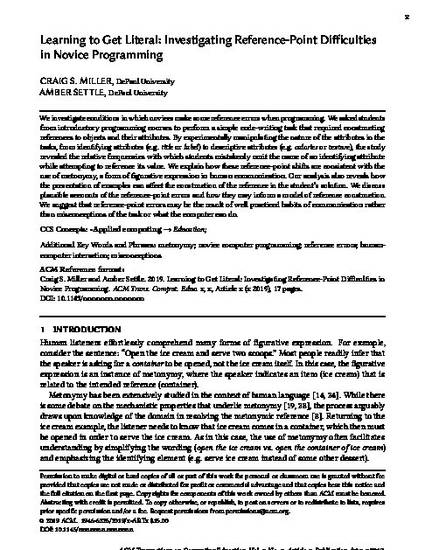
Article
Learning to Get Literal: Investigating Reference-Point Difficulties in Novice Programming
ACM Transactions on Computing Education
(2019)
Abstract
We investigate conditions in which novices make some reference errors when programming. We asked students from introductory programming courses to perform a simple code-writing task that required constructing references to objects and their attributes. By experimentally manipulating the nature of the attributes in the tasks, from identifying attributes (e.g., title or label) to descriptive attributes (e.g., calories or texture), the study revealed the relative frequencies with which students mistakenly omit the name of an identifying attribute while attempting to reference its value. We explain how these reference-point shifts are consistent with the use of metonymy, a form of figurative expression in human communication. Our analysis also reveals how the presentation of examples can affect the construction of the reference in the student’s solution. We discuss plausible accounts of the reference-point errors and how they may inform a model of reference construction. We suggest that reference-point errors may be the result of well-practiced habits of communication rather than misconceptions of the task or what the computer can do.
Keywords
- Metonymy,
- novice computer programming,
- reference errors,
- human-computer interaction,
- misconceptions
Disciplines
Publication Date
April, 2019
DOI
https://doi.org/10.1145/3313291
Citation Information
Craig S. Miller and Amber Settle. 2019. Learning to Get Literal: Investigating Reference-Point Difficulties in
Novice Programming. ACM Trans. Comput. Educ. 19, 3, Article 28 (April 2019), 17 pages.
https://doi.org/10.1145/3313291
